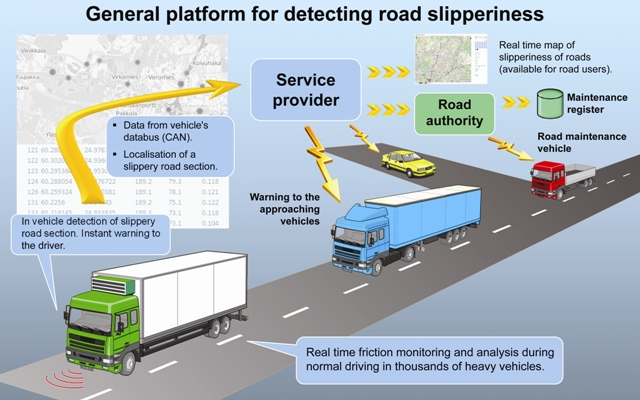Jan 23 2013
VTT's technology makes driving on black ice safer

VTT Technical Research Centre of Finland has developed an automatic slipperiness detection system for cars. The system helps drivers to avoid personal injuries and damage to vehicles in slippery road conditions. Thanks to the system, vehicles are warned in advance of a road's actual slipperiness. If the road becomes slippery, other vehicles arriving in the area will also be warned immediately.
VTT's system makes use of an entirely novel, real-time method of obtaining information on a road's actual slipperiness. Transmission of slippery road warnings to vehicles via, for example, SMS messages has been tested before but, lacking the information now available, warnings have been based on estimates derived from sources such as weather forecasts. Thanks to the new system, it is possible to obtain direct information on road conditions.
Slipperiness detection is based on a method developed by VTT, whereby changes in road conditions are detected in real time, based on data collected by the car's own sensors. "The method entails estimating the difference in the speeds of the drive shaft and freely rotating axles in various driving situations, which enables deduction of the level of friction", says Senior Scientist Kimmo Erkkilä.
The system is capable of determining the slipperiness of a road on the basis of a drive of a few kilometres. The information is then passed on to the driver, before he or she has even noticed the change in road conditions. After this, observations collected from all cars and the related coordinates are transmitted wirelessly to a background system, which maintains a real-time slipperiness map and generates a log of the road conditions. For each car that joins the system, the background system produces and transmits an individual data package on road conditions. This allows drivers to prepare in advance for slippery stretches of road.
Various vehicle terminal devices can be used to join the system, as long as they have sufficient capacity to carry out the slipperiness detection calculations, have a link to the vehicle's data bus, are equipped with a location tracking system and are able to connect to the background system. Information on the level of slipperiness can be transmitted to drivers by means of warning lights, voice signals, text or symbols, according to the possibilities offered by the terminal device. As well as through vehicle terminal devices, this information can be utilised via many other communication channels, such as smart phones, the national media, weather forecasts or roadside signs.
Fits all makes
Developed by VTT, this system fits all cars, irrespective of their make. At present, the system has been used in heavy lorries, but is also directly compatible with other heavy vehicles. Using the current method, passenger cars can also make use of the slipperiness data produced by the system. In the future, the system can be expanded to make use of observations collected from passenger cars.
The method's functionality has been tested in the field, in cooperation with Itella Logistics (former VR Transpoint's groupage logistics business).
Widespread implementation of the system would create significant savings for transport operators, other road users and society at large.
For VTT's part, the system is ready for commercialisation. Negotiations to commercialise the system are under way with the first candidate, EC-Tools.
The system was developed into its current form under the three-year Energy efficient and Intelligent Heavyduty Vehicle (HDENIQ) research project, principally funded by Tekes.